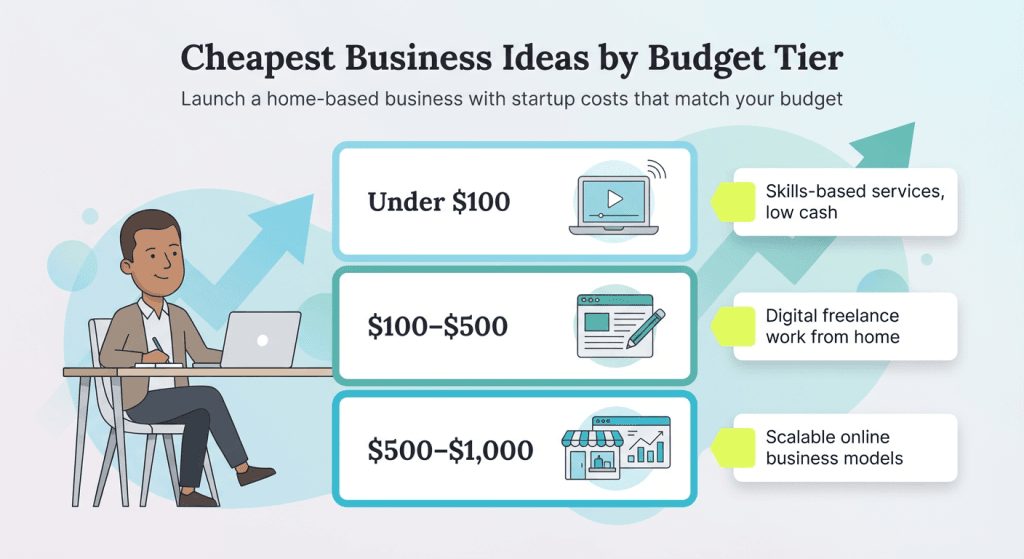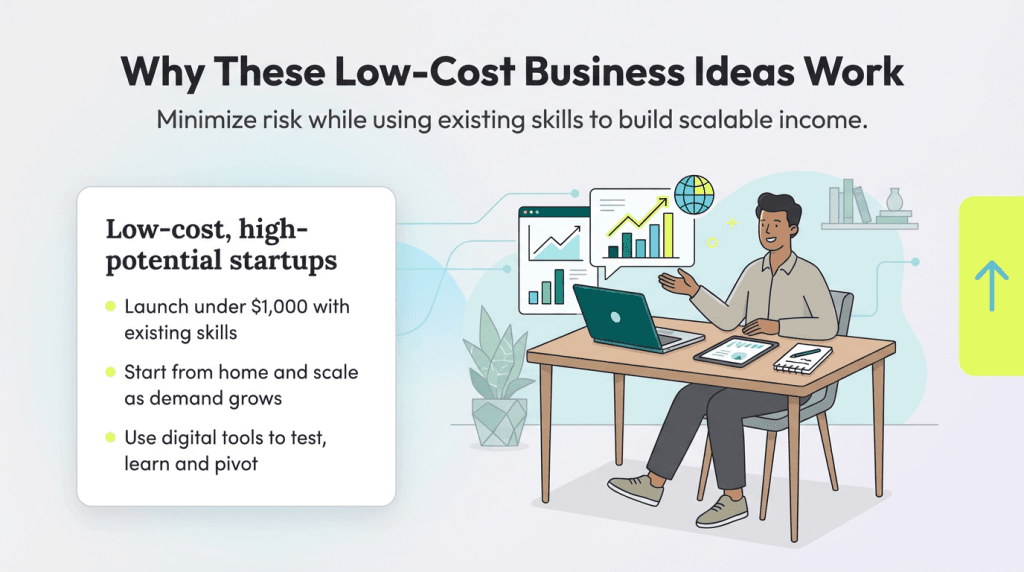Launching a home business on a budget has never been more accessible, with countless opportunities for aspiring entrepreneurs to start profitable ventures from their living rooms. The cheapest business ideas to start from home often require nothing more than a computer, internet connection, and your existing skills or interests. Low-startup-cost businesses are becoming increasingly viable in today’s digital economy, so you don’t need thousands of dollars or a commercial lease to begin building your entrepreneurial dreams. Nearly 90 percent of millionaires are business owners, proving that the path to financial independence often begins with taking that first entrepreneurial leap.
The following low-cost businesses represent some of the most promising opportunities for budget-conscious entrepreneurs ready to work from home. Each business idea has been selected based on minimal initial investment requirements, scalability potential and the ability to generate income relatively quickly. Whether you’re looking to replace your full-time income or simply earn extra money on the side, these home-based ventures can be tailored to match your current resources, skills and available time. Consider your personal and professional strengths and interests as you explore these cheap business opportunities that could transform your spare room into your new office.
Cheapest business ideas by budget tier
Here are 20 cheap, home-based businesses you can start, organized by the startup budget required.
Under $100
1. Virtual educator or trainer
One of the cheapest ways to start a business is to provide your own services if you have a talent or skill. Melissa Schneider, executive and leadership coach at Melissa Schneider Leadership Coaching & Development, pointed to a chef in Nashville, Tennessee, who was laid off during the pandemic. He used his love and knowledge of cooking to start offering online cooking classes. The startup cost wasn’t too much, amounting to a computer and an internet connection.
“He was able to sell his service in a completely different way,” Schneider told us.
Get creative with how you can use your skills in a new and unique way to educate others. Differentiating your product from the competition will increase your chances of gaining clients or students. One booming education trend that may help is gamification, which encourages interaction and engagement.
- Ideal startup cost: $25-$75
- Required skills: Subject matter expertise, teaching ability, basic tech skills
- Profit potential: $25-$75+ per hour
- Scalability notes: Create online courses and passive income streams.
2. Home-based content creator
Create content for businesses through blog writing, social media posts or video production. With businesses increasingly focusing on digital marketing, content creation has become essential.
- Ideal startup cost: $0-$50
- Required skills: Writing, creativity, basic marketing knowledge
- Profit potential: $15-$100+ per hour
- Scalability notes: Build recurring client relationships and expand service offerings.
3. Virtual bookkeeping services
Offer bookkeeping and basic accounting services to small businesses from your home office. Many entrepreneurs need help organizing their finances, but can’t afford full-time accountants.
- Ideal startup cost: $50-$100
- Required skills: Basic accounting knowledge, attention to detail, bookkeeping software proficiency
- Profit potential: $30-$60 per hour
- Scalability notes: Obtain certifications and add more complex financial services.
Our guide to the
best accounting software can help you find the right program to use for your business, whether you're managing someone else's finances or tracking your own.
4. Home tutoring services
Tutoring requires minimal startup costs and leverages existing knowledge. Provide one-on-one or small group tutoring in academic subjects, test preparation or specialized skills.
- Ideal startup cost: $25-$75
- Required skills: Subject expertise, teaching ability, patience
- Profit potential: $25-$100+ per hour
- Scalability notes: Develop online courses and group programs.
$100–$500
5. Social media marketer
Social media has become a powerful tool for companies to spread the word about their brands. If you’re social media-savvy, there are tons of businesses looking for your expertise to help them develop social media marketing strategies, set up and post on their accounts, and increase their number of followers (and hopefully sales). If you’re an expert with popular platforms like TikTok and Instagram, even better. Knowledge, not money, is the key to getting this low-cost business up and running.
Another thriving component of social media marketing to consider is influencers and branding. According to Statista, the global influencer marketing market value was $24 billion in 2024 and is still growing. You don’t necessarily need to be an influencer yourself, but if you know how to get influencers to market a product, this could be a lucrative part of your social media marketing business strategy.
- Ideal startup cost: $200-$400
- Required skills: Social media expertise, content creation, analytics understanding
- Profit potential: $500-$5,000+ per month per client
- Scalability notes: Add multiple clients and offer comprehensive digital marketing packages.
6. Freelance writer or editor
If you have a knack for editing and/or writing, you can turn your expertise into a small business. With the proliferation of online content and social media marketing, there are many opportunities to get paid for writing and editing. It takes little money to get up and running, but you’ll have to prove your worth to clients. Showcasing your work in an online portfolio can help.
- Ideal startup cost: $100-$300
- Required skills: Excellent writing/editing abilities, SEO knowledge, client communication
- Profit potential: $0.10-$2.00+ per word or $25–$150+ per hour
- Scalability notes: Specialize in high-value niches like technical or marketing content.
7. Virtual assistant
Business owners need help with everyday tasks, from organizing record books to responding to customer emails. As a virtual receptionist, you’ll perform all these tasks from the comfort of your home, and you can take on multiple clients at once. All it takes is a computer and an internet connection to start a virtual assistant business.
- Ideal startup cost: $150-$400
- Required skills: Organization, communication, basic tech proficiency, time management
- Profit potential: $15-$75+ per hour
- Scalability notes: Specialize in specific industries or expand to team-based services.
8. Online seller or reseller
Whether you want to sell apparel, collectibles or something else, you can easily get up and running online on the cheap. Marketplaces like Amazon, eBay, Poshmark and Etsy let you sell your products for a cut of the sale, while e-commerce platforms charge a low monthly fee to hawk your products over the internet.
It doesn’t take too much money to purchase your initial inventory. You can buy bulk items online or at a local discount store, upcycle vintage or thrifted apparel, or tap into the inventory you already have at home. (All those old baseball cards may be worth something!) The idea is to sell the products for more than you purchase them, taking into account any marketplace or e-commerce platform fees.
- Ideal startup cost: $200-$500
- Required skills: Product research, customer service, basic marketing, inventory management
- Profit potential: 20-50 percent profit margins on products
- Scalability notes: Expand product lines and build brand recognition.
9. Home-based web designer
Web design is a thriving business since most companies need a website to succeed. You can design and update websites either by coding from scratch or using platforms like WordPress or other top website builders. The biggest investment here is time — but the more time you spend, the more money you stand to earn.
- Ideal startup cost: $200-$500
- Required skills: Web design software, coding knowledge, creative design sense
- Profit potential: $30-$150+ per hour or $500-$5,000+ per project
- Scalability notes: Add hosting services and ongoing maintenance contracts.
>> Read Next: How to Choose a Domain Name for Your Business
10. Home-based graphic designer
Create visual content for businesses, including logos, marketing materials and branding elements. With companies across all industries needing design work, freelance graphic designers are in high demand.
- Ideal startup cost: $300-$500
- Required skills: Design software proficiency, creative vision, client communication
- Profit potential: $25-$100+ per hour
- Scalability notes: Build brand identity packages and retainer relationships.
$500–$1,000
11. Dropshipper
Cash-strapped would-be business owners can start a dropshipping business. With this business model, you build an online storefront or use an e-commerce platform but don’t hold the inventory. The products are shipped directly from the manufacturer after a customer purchases from your online store. To get a virtual store up and running using this method, you only need to pay for the domain subscription and the fees associated with using an e-commerce or dropshipping program.
“The beauty of the dropshipping model is you don’t have to actually manufacture any products to get started,” said Meghan Stabler, chief marketing officer at ThriveCart. “Rather, you partner with a manufacturer that makes your products and ships them directly to your customers, freeing you up to focus on the fun part: the marketing and customer experience.”
- Ideal startup cost: $500-$1,000
- Required skills: E-commerce platform management, digital marketing, customer service
- Profit potential: $1,000-$100,000+ monthly revenue
- Scalability notes: Expand product catalog and optimize conversion rates.
12. Affiliate marketing content creator
If you’re interested in content creation, you can take advantage of the many affiliate marketing programs available. Leverage platforms like YouTube, TikTok or Instagram to earn commission by promoting products without directly selling them. This is a great business option for those who already have an established website or large social media following.
- Ideal startup cost: $500-$800
- Required skills: Content creation, audience building, marketing strategy
- Profit potential: 1-10%+ commission on sales generated
- Scalability notes: Build multiple revenue streams and expand audience reach.
13. AI chatbot developer
If you’re a tech-savvy developer with a deep understanding of artificial intelligence, use AI platforms like ChatGPT to create custom chatbots for businesses. You can offer chatbot solutions for customer service, marketing or automation tasks, with minimal costs for tools and hosting.
- Ideal startup cost: $600-$1,000
- Required skills: Programming, AI platform knowledge, business automation understanding
- Profit potential: $1,500-$10,000+ per project
- Scalability notes: Create standardized solutions and recurring maintenance contracts.
14. Airbnb host
If you have an extra bedroom or living unit, you can become an Airbnb host. The barrier to entry is low — it’s completely free to list your property and become a host. Of course, you’ll need to have the extra property or space to begin with and pay for the upkeep, but you’ll start making decent revenue once you’re regularly booking reservations. If you’re considering renting out your property, read our guide to becoming a full-time Airbnb entrepreneur.
- Ideal startup cost: $500-$1,000
- Required skills: Hospitality, property management, customer service
- Profit potential: $50-$300+ per night
- Scalability notes: Expand to multiple properties or premium accommodations.
15. Consultant
Businesses need advice, but not all of them want to hire a full-time employee to get it. That’s where consultants come in. Use your background and expertise to find the areas where you would bring the most value to a company as an advisor. That may entail offering consulting services on marketing, accounting, engineering, cybersecurity, information technology or any other area you can find demand for that fits your expertise.
If you provide good counsel at a reasonable cost, your reputation will grow, allowing you to expand your business. To get up and running, you’ll need a website or social media presence and must be willing to network on platforms like LinkedIn.
- Ideal startup cost: $500-$800
- Required skills: Deep industry expertise, communication, business analysis
- Profit potential: $75-$500+ per hour
- Scalability notes: Develop proprietary consultancy methodologies and build a team.
16. Virtual event planner
Event management from home has become a realistic path for creative entrepreneurs, thanks to the growth of virtual events, hybrid gatherings and advanced digital tools. You can coordinate corporate meetings, webinars, online conferences and hybrid events entirely from your home office using event management software and virtual meeting platforms.
The advantages include lower startup costs since there’s no need for office space, broader client reach through digital platforms, and the ability to serve both local and international markets. With tools like WordPress event management plugins and virtual meeting platforms, you can manage registrations, coordinate logistics and deliver professional client experiences.
- Ideal startup cost: $500-$800
- Required skills: Organization, project management, client communication, technical proficiency with event software
- Profit potential: $30-$150+ per hour or $1,000-$10,000+ per event
- Scalability notes: Expand from solo events to coordinating large corporate conferences and building vendor networks.
17. Translator
If you’re fluent in another language, you can easily launch a translation service. There’s demand from the medical, legal, publishing and small business communities for people who can translate information into English and other languages. A freelance translation business won’t cost you much in startup expenses and can quickly expand as your customer base grows.
- Ideal startup cost: $500-$700
- Required skills: Bilingual fluency, writing skills, cultural knowledge
- Profit potential: $0.10-$0.50+ per word or $25-$100+ per hour
- Scalability notes: Obtain specialty certifications and build a translation agency.
18. NFT art or digital asset creator
Although art creation was once reserved for painters, sculptors and photographers, the proliferation of digital technology has caused a new form of artwork to emerge. You can dive into the growing world of blockchain and create NFT art or digital collectibles. Tools like OpenSea and Rarible make it accessible to get started with minting and selling.
- Ideal startup cost: $600-$1,000
- Required skills: Digital art creation, blockchain understanding, community building
- Profit potential: $10-$10,000+ per piece
- Scalability notes: Build brand recognition and expand into utility NFTs.
19. Home-based daycare
Home daycare is great for those who enjoy caring for children, particularly parents already staying home. Check local and state regulations for required credentials and permits.
- Ideal startup cost: $500-$1,000
- Required skills: Childcare experience, patience, regulatory compliance knowledge
- Profit potential: $25-$60 per child per day
- Scalability notes: Add more children within regulatory limits or expand locations.
20. Digital marketing specialist
Create comprehensive digital marketing campaigns using search engine optimization, pay-per-click advertising and content marketing. Small businesses desperately need these services but often lack the budget to employ large agencies, creating perfect opportunities for home-based specialists to offer affordable, personalized solutions.
- Ideal startup cost: $600-$1,000
- Required skills: SEO, PPC advertising, analytics, content strategy
- Profit potential: $50-$200+ per hour or $2,000-$10,000+ per month per client
- Scalability notes: Build a full-service marketing agency with specialized teams.
According to the
Bureau of Labor Statistics, the professional, scientific and technical services sector is projected to be the fastest-growing from 2023 to 2033.













